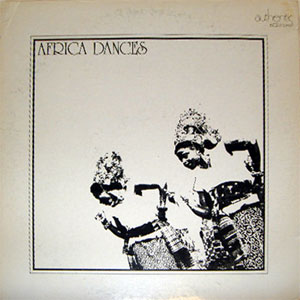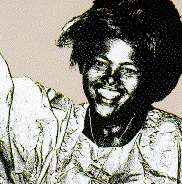Wayne’s been quiet as of late, which makes his recent piece on nu world music all the more welcome. i voice my preliminary response in the comments, and will flesh things out more fully here no doubt…
a few weeks ago Andy sent me this wonderful, thought-provoking interview with John Storm Roberts, founder of the Original Music label and author of Black Music of Two Worlds and The Latin Tinge.
Interviewed twenty years ago, Roberts’ thoughts remain freshly relevant to the discussion Wayne has sparked. some excerpts:

YOU’VE TALKED ABOUT THE INFLUENCE OF AMERICAN AND CUBAN MUSIC ON AFRICAN MUSIC. IN YOUR CATALOG, YOU TALK ABOUT ‘BLAND SYNTHESIZED AFRO-POP.’ DO YOU THINK MUSICAL CROSS-POLLENIZATION IS A BAD THING THEN?
Absolutely not. All music is cross-pollenized. With the stuff I was studying, the African pop music which I was writing about very enthusiastically, the term in those days, which was said with a shudder of good taste, was ‘westernized.’ Nobody complains that African music is ‘Arab-ized.’ It just happened earlier. Is it OK because it happened a hundred years ago but it’s not OK because it happened 30 years ago? I mean, there are legitimate though unfounded fears. It’s been said to me ‘It’s not the fact that westernization is good or bad but that the Arabization of African music happened over a longer period.’ The enormous amount available of foreign culture is the problem. It’s like a tidal wave versus the tide coming in.
But the thing is that this is overstated. Firstly, in most countries, there’s far more local music going on than people realize. Also, there’s this kind of well meaning neo-colonialism. People who fear for foreign cultures, certainly big cultures, are really kind of neo-colonialists. The implication is that these are poor, weak and therefore second-rate cultures and because they’re so weak, anything that happens to them will cause them to disappear. In point of fact, there were many Ghanaians that were worried that highlife was being killed by Congolese music. What was happening was that it was fashionable and the guitarists were borrowing licks but they were still also playing highlife. In 1970, I was told that James Brown was killing highlife dead. James Brown was hugely popular. But highlife was still going strong. It was just another influence. Fads and fancies come along all the time. For a while, it seems to be everywhere- the bands are playing the music and the kids are wearing the T-shirts. But it doesn’t last long. The original music just goes on.
Musicians pinch from everywhere. It’s true that the real small cultures have tended to disappear but they always have. The Latin culture that people are proud of is the result of various other cultures not only mixing but also blending into it. My own culture, the Scottish music and Celtic singing styles, are thought to be the remains of English music with strong middle-eastern influences. Most of the music that people think of as traditional Italian or whatever now was a new style that grew up in the nineteenth century that pushed out something else from earlier. We would all be living in caves if things didn’t change. Some things disappear and it’s a balance.
WHAT DO THINK ABOUT THE POPULARITY OF ‘WORLD MUSIC’ IN THE LAST FIVE OR TEN YEARS?
It’s only become mildly more popular. When you can figure out why towns in this country now have Thai restaurants which 20 years ago would probably have regarded the pizzeria as the most exotic restaurant in town, I’ll tell you why world music is more popular. I think it’s just that the extremely provincial American outlook is beginning to change at all sorts of level. You’ve got to remember that from the point of view of someone who’s come here from elsewhere, this is a very isolated as well as a very large country with a little bit of trickle of Canada at the top (which seems like a 51st state to most Americans anyway) and Mexico at the bottom of it (which is still for most Americans just a place to go for honeymoons). As far as any personal experience is concerned, the fact of the matter is that this is a huge and isolated country. Americans are as isolated as the Tajiks, in fact more isolated because the Tajiks are in the middle of large numbers of cultures even if they’re not cultures we know.
WHAT DO YOU THINK ABOUT THE ROLE OF MUSIC IN AMERICAN CULTURE AS OPPOSED TO IT’S ROLE IN OTHER CULTURES?
It’s a tricky question. Music is an integral part of African culture and is used in ways that it isn’t used in the States. It’s more interesting that it’s more activity-related. There is bed-wetting music as well as putting-baby-to-sleep music in some countries. It’s possible that as Western societies have become less communal, the thing has changed. There are a lot of aspects of music that people don’t know the background of. Call and response singing was far more common in Europe than is now because things were done differently. When people were farming by hand, they sang call and response songs. But there are certain differences. The mass in Roman Catholicism remains a valid mass even if there is no music. You cannot have a valid Santeria ceremony without the appropriate rhythms because the gods will not come without the right rhythms.
the whole interview is quite fresh, and Andy informs me that the LPs Roberts put out are amazing… In an unintended nob to Andy (whose band works closely with a number of Ethiopian musicians), Waxidermy hosts an Alemayehu Eshete tune from Authentic’s early catalog (Roberts later changed the name to Original).


thanks for the lovely textual, musical, and ideological resonances. here’s to more echoes along and across these lines —
my favorite part about that track via waxidermy: that ol’ bluesy bassline (recontextualized yet again), as heard in countless 12-bar tunes, natch, but also in pop fare like (hip-hop fave) otis redding’s “tramp,” prince’s “get off” (if i recall correctly), and in my favorite link of all, the guitar line in sly&robbie’s “murder she wrote” riddim (which itself has animated countless reggae and reggaeton tunes). been meaning to get around to a mini-mega-mix of all these (and more), and this will make a fine addition!
Thanks so much for this – John Storm Roberts is a giant, and really inspirational. Any of his CD collections (or LP collections) on his “Original Music” label are just superb – if one can find them, aaah!
Whatever you thought of his music theory, Roberts is a great character. He began his post-colonial globetrotting as a journalist I believe and fell into the record thing. A role model Brit expat.
His compliations were excellent and at the time unrivaled in their archival digging. And notable for good liner info but with an informal journalistic rather than academic approach, which was still a bit unusual at the time (exceptions that come to mind: GlobeStyle, perhaps World Circuit).
Sublime Frequencies fans: Original Music may have also presaged the current “exotic” hipster comp boom in its reportedly, um, casual approach to licensing. But they did have better liners than the Sublime comps (pet peeve) which often don’t even credit artists (boo). Artist credit at least grants a degree of respect. The exoticist approach of some of the Sublime stuff that young hipsters are eating up is troubling to me (but that’s another story)…
Roberts and his staff were guests on my WFMU radio show once, and sometime after that we went to a yard sale at his place in rural Tivoli, New York. I proudly possess a Ramblers Dance Band LP (among others) that probably was used as a master…
(Also, I for one generally agree with his non-hysteric approach to traditional and indigenous culture and change – and how it isn’t all being swamped by Euro-American culture after all – there is some amazing give-and-take going on. From “hip-life” to Bucovina club…)
Rob Weisberg / WFMU Radio Jersey City, NJ / http://www.wfmu.org/tsp
great comments/info Rob, thanks! what i would give to attend a J. Storm Roberts yard sale!!!
im just finishing his book ‘Black Music of Two Worlds’, its a fascinating read which ill try to write about here in the coming weeks.
Hi, yeah I’m a big fan of this book also. A real eye opener.
I know this is now an ad (I’m no longer paid to research music!) but check this out your going to like it anyway.
http://www.ethiopiques.info
It’s a fansite set up to celebrate the release of a 2CD pack of classic Ethiopian groove.
Just thought you might be interested.
Best wishes